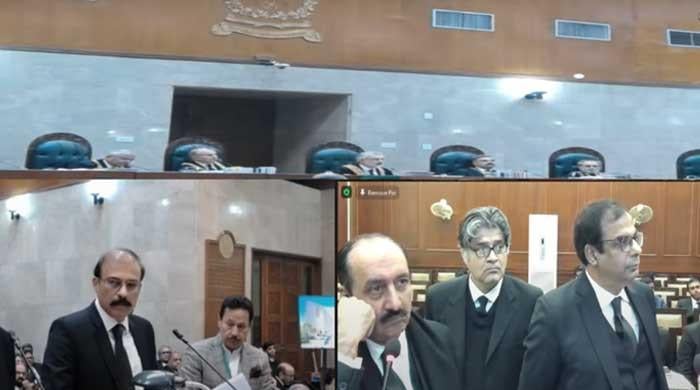The outcome of the proceedings will likely affect Nawaz Sharif and Jahangir Tareen’s electoral prospects
- Lifetime disqualification, amended election act could not co-exist.
- Nawaz, Tareen disqualified by SC under Article 62(1)(f) in 2017.
- Elections Act amendments reduced disqualification limit to 5 years.
ISLAMABAD: The Supreme Court on Tuesday began hearing on the matter of lifetime disqualification of lawmakers to determine whether the public officer holders’ ineligibility is for life under Article 62 (1) (F) or for five years in line with the amended Election Act 2017.
A seven-member larger bench led by Chief Justice of Pakistan (CJP) Justice Qazi Faez Isa is hearing the case of lifetime disqualification of lawmakers.
The other members of the bench include Justice Syed Mansoor Ali Shah, Justice Yahya Afridi, Justice Aminuddin Khan, Justice Jamal Khan Mandokhel, Justice Muhammad Ali Mazhar and Justice Musarat Hilali.
The proceedings of the case are being live broadcast on SC’s website and YouTube channel.
On December 11, 2023, the chief justice while heading a three-member bench hearing a matter related to the disqualification of a former PML-N provincial lawmaker Sardar Meer Badshah Khan Qaisrani last month, took notice of the contradiction between its judgment and the legislation made through an amendment to the Election Act pertaining to the lifetime disqualification.
The chief justice had observed that the Supreme Court’s judgment on lifetime disqualification and the amendments made to the Election Act 2017 could not exist simultaneously.
He further said either the legislation enacted by parliament to the Elections Act or the judgment delivered by the Supreme Court will prevail.
The court had referred the matter to a three-member committee, constituted under Section 2 of the Supreme Court (Practice and Procedure) Act, 2023 that takes the decision on fixation of cases before the apex court benches.
An apex court judgment in the year 2018 had held that any person disqualified under Article 62(1)(f) of the Constitution would be lifetime.
Former prime minister Nawaz Sharif and then Pakistan Tehreek-e-Insaf (PTI) leader Jahangir Tareen were disqualified by the Supreme Court under Article 62(1)(f) of the Constitution in 2017.
The court had ruled that Nawaz had been dishonest to the parliament and the courts, and thus, he could not be deemed fit for his office.
Later, an accountability court awarded him 10-year imprisonment in the Avenfield apartments and seven years in Al-Azizia references.
However, the Islamabad High Court acquitted him in both cases after the former premier returned to the country.
In 2023, the coalition government of PDM made an amendment to the Elections Act 2017, decreasing the legislator’s disqualification to five years retrospectively.
The matter is of immense importance as the general elections are being held on February 8, while the Election Commission of Pakistan has rejected the nomination papers of most of the main aspiring candidates of PTI including its founder Imran Khan.
The electoral body, however, has accepted the nomination papers of most of the PML-N candidates including its supremo Nawaz which invited criticism from PTI leaders on the role of the commission.
What’s the difference between Articles 62 and 63?
During the hearing of the case, CJP Isa asked Attorney General for Pakistan (AGP) Mansoor Usman Awan to explain the difference between Articles 62 and 63.
To which, the AGP said Article 62 deals with the eligibility of parliamentarians while 63 is related to disqualification.
The CJP observed that the sub-clauses of Article 62 that deal with the public office holder’s character created difficulty.
“How can the character of any person be determined? Is the attorney general a person of good character?” the CJP remarked saying that he asked the question related to AGP as an example.
The CJP said supporters will say a person in question is of high character, while his opponents would describe his character as worst.
CJP Isa observed according to Islamic standards, no one can be declared a person of high character.


